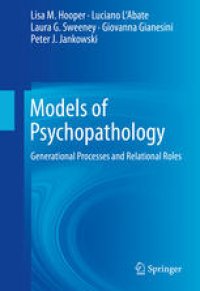
Ebook: Models of Psychopathology: Generational Processes and Relational Roles
Author: Lisa M. Hooper Luciano L'Abate Laura G. Sweeney Giovanna Gianesini Peter J. Jankowski (auth.)
- Tags: Clinical Psychology, Family
- Year: 2014
- Publisher: Springer-Verlag New York
- Edition: 1
- Language: English
- pdf
This book explores current relational models of psychopathology that undergird a great many conflicts and destructive outcomes in family and intimate relationships. These models have similar features and can be considered as a group. They are all: (1) generational; (2) relational; and (3) fundamentally reactive processes stemming from existing psychopathology.
The family is the essential human relationship, offering love, support, and trust between partners, vital bonds between siblings, and the care and nurturing of children to ensure a healthy next generation. Ironically, this seminal unit can also be a blueprint for and deadly source of lifelong problems and dysfunctional solutions, with the potential for damage to future roles and relationships.
Models of Psychopathology probes familial roles and intimate relationships as vehicles for—often times but not always—emotional disturbance and damage to child and adult relationships. The four constructs examined here—parentification, parental alienation behavior, bullying, and Stockholm syndrome—are of great importance, frequently appearing in the clinical and empirical literature and news as subjects of heated controversy (especially in the case of parental alienation). A panel of experts, including Luciano L'Abate and Lisa M. Hooper, teams Relational Competence Theory and the deadly drama triangle with affiliated models to reveal key aspects of specific roles, relational, and generational patterns as they contribute to maladaptive and normative behaviors. Among the book's features:
- A combined conceptual-theoretical approach for clearer understanding of key issues.
- Up-to-date chapters exploring parentification, parental alienation, bullying, and Stockholm syndrome.
- A continuum of outcomes, from normative to pathological.
- Therapeutic guidelines for working with clients whose families reflect the models.
- Implications for future research and practice.
- Workbook appendices offering tools for assessment and intervention.
As a source of innovative answers to common family- and relationally-based dilemmas, family therapists, clinical psychologists, and diverse mental health providers will find Models of Psychopathology timely, challenging, and ultimately rewarding.